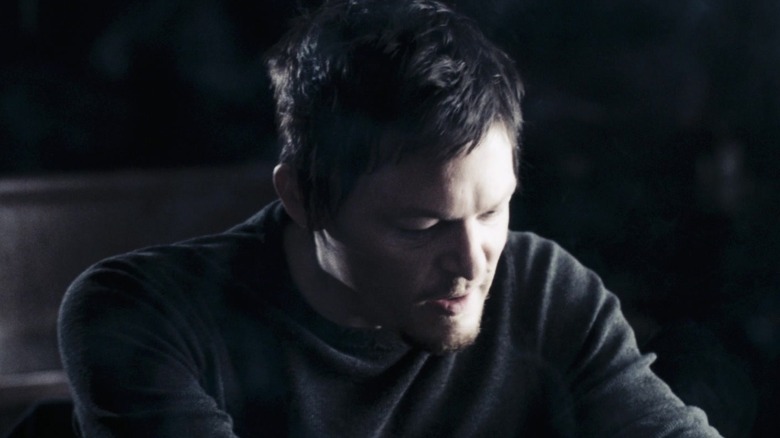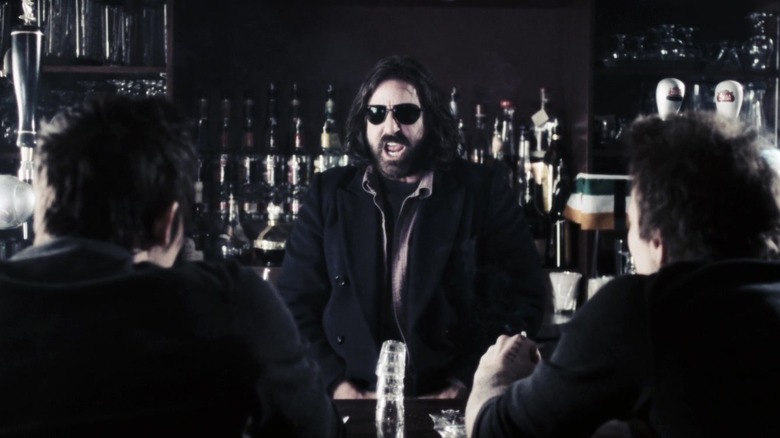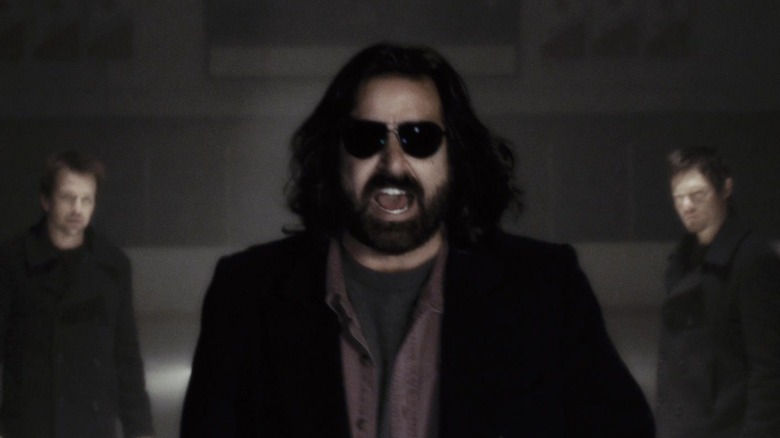John Wayne Was The Subject Of One Of The Weirdest Scenes In A Norman Reedus Movie
Troy Duffy's 1999 film "The Boondock Saints" cause a minor commotion in the indie film world when it was first released. It's an aggressively masculine film about two Irish twin brothers, played by Sean Patrick Flanery and Norman Reedus, who become Punisher-like vigilantes and take it upon themselves to ride Boston of the Russian mob. There is a lot of male posturing, a lot of verve, and many, many, many bullets fired. "Saints" had a surreal edge to it, underlined by the two protagonists' Catholic faith. It was an American-inflected version of a Guy Ritchie film. It didn't make money at the box office, but was a bonanza on home video. There was a time when every white guy aged 17 to 22 had a DVD copy of "The Boondock Saints."
Troy Duffy was notably ... assertive when he made the movie. The man was a blowhard and an egotist, all captured on film in the 2003 documentary "Overnight." College-age bros the world over loved "The Boondock Saints," and it seems fitting that it should have come from an outwardly toxic dude-bro like Duffy.
In 2009, Duffy returned to make "The Boondock Saints II: All Saints Day," hoping to recapture the magic. The sequel wasn't nearly as well-received by fans and it was hated by critics, but it still managed to make some money at the box office, something the first film failed to do.
Near the end of "Saints II," there is a truly bizarre fantasy sequence that serves to underline the ultra-masculinity of the characters. The two MacManus brothers sit in a bar smoking, when their dead friend David "The Funny Man" Della Rocco (David Della Rocco) appears and raves for several straight minutes about how they need to draw masculine energy from the ghost of John Wayne.
The characters from The Boondock Saints II ranted about John Wayne
One can tell that the Funny Man sequence is a dream because the color washes out, indicating that we are one step away from reality. The MacManus brothers are sad and dreary when David steps in with his floppy hair and sunglasses to give them a pep talk. The three of them compare a dead compatriot (I shan't spoil whom) to legendarily tough movie actors like Clint Eastwood, Charles Bronson, and, in their words, "Duke F***ing Wayne." Rocco then proceeds to vaunt the aggression and destructiveness of male-kind, and the camera spins them into fantasy locations, like rooftops and underground parking structures.
The speech, spread among them, reads thus:
"Men build things, then we die. It's in our f*** ing DNA! That's what we do! And when it all falls down? We build it right back up again. But this time bigger! Better! [Looking out over the city] Look! Look what we can do. Look how f***in' beautiful we are. You think the men that built all this had it easy? Hard men! Doing hard s***! And that gives me a hard-on! But not in a gay way or anything. [...] I am so sick of all of this self-help, twelve-step, leftover hippie generation bulls***!"
The rejection of "soft" twelve-step language, one will likely note, mirrors some of the dialogue from David Fincher's "Fight Club," which came out the same year as the first "Boondock Saints." But whereas "Fight Club" was a dissection and deconstruction of unhealthy old-world masculine bluster, "The Boondock Saints II" means it.
The Boondock Saints II holds up John Wayne as the masculine ideal
One can also hear echoes of Denis Leary's 1992 album "No Cure for Cancer," specifically a song he recorded called "A**hole." In that song, Leary raves about how the world has become too wimpy, and how he aimed to unfreeze a cryogenically frozen John Wayne to restore manliness. John Cassavetes, Lee Marvin, and Sam Peckinpah were also part of the "squad," revealing that Leary looked to a certain genre of ultra-violent movies to get his masculine ideals.
The characters in "The Boondock Saints II" agree with Leary, 17 years after the fact. They felt that Wayne was masculine specifically because of his emotion-suppressing, continuing:
"Now they don't want you to do anything, right? Just sit there. Don't drink, don't smoke, don't drive fast. Kiss my ass! F*** it! Do it all, I say! Do you think Duke Wayne spent all of his time talking about his feelings with a f***in' therapist? There's no f***ing way he did! John Wayne died with five pounds of undigested red meat in his ass. Now that's a man! Real men hide their feelings. Why? Because it's none of your f***in' business! Men do not cry. Men do not pout. Men jack you in the f***in' jaw and say 'Thanks for comin' out.'"
It's a weird fantasy sequence in an already-stylized movie. It feels like a poem, and there's a good chance that ambitious theater students have transcribed and performed the rant as an audition for their college play. If not, someone ought to try.


